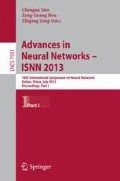Abstract
Most algorithms have been extended to the tensor space to create algorithm versions with direct tensor inputs. However, very unfortunately basically all objective functions of algorithms in the tensor space are non-convex. However, sub-problems constructed by fixing all the modes but one are often convex and very easy to solve. However, this method may lead to difficulty converging; iterative algorithms sometimes get stuck in a local minimum and have difficulty converging to the global solution. Here, we propose a computational framework for constrained and unconstrained tensor methods. Using our methods, the algorithm convergence situation can be improved to some extent and better solutions obtained. We applied our technique to Uncorrelated Multilinear Principal Component Analysis (UMPCA), Tensor Rank one Discriminant Analysis (TR1DA) and Support Tensor Machines (STM); Experiment results show the effectiveness of our method.
Access this chapter
Tax calculation will be finalised at checkout
Purchases are for personal use only
Preview
Unable to display preview. Download preview PDF.
References
Lu, H., Plataniotis, K.N., Venetsanopoulos, A.N.: Multilinear principal component analysis of tensor objects for recognition. In: Proc. Int. Conf. on Pattern Recognition, pp. 776–779 (2006)
Lu, H., Plataniotis, K.N., Venetsanopoulos, A.N.: Uncorrelated multilinear principal component analysis through successive variance maximization. In: ICML (2008)
Tao, D., Li, X., Wu, X., Maybank, S.: Tensor rank one discriminant analysis-a convergent method for discriminative multilinear subspace selection. Neurocomput. 71(10-12), 1866–1882 (2008)
Tao, D., Li, X., Wu, X., Maybank, S.J.: General tensor discriminant analysis and gabor features for gait recognition. IEEE Trans. Pattern Anal. Mach. Intell. 29(10), 1700–1715 (2007)
Alex, M., Vasilescu, O., Terzopoulos, D.: Multilinear independent components analysis. IEEE Computer Society Conference on Computer Vision and Pattern Recognition 1, 547–553 (2005)
Shashua, A., Hazan, T.: Non-negative tensor factorization with applications to statistics and computer vision. In: Proceedings of the International Conference on Machine Learning (ICML), pp. 792–799. ICML (2005)
Cai, D., He, X., Wen, J.-R., Han, J., Ma, W.-Y.: Support tensor machines for text categorization. Technical report, Computer Science Department, UIUC, UIUCDCS-R-2006-2714 (April 2006)
Tao, D., Li, X., Hu, W., Maybank, S., Wu, X.: Supervised tensor learning. In: Proceedings of the Fifth IEEE International Conference on Data Mining, ICDM 2005, pp. 450–457. IEEE Computer Society, Washington (2005)
Acar, E., Kolda, T.G., Dunlavy, D.M.: An optimization approach for fitting canonical tensor decompositions. Technical report (2009)
Kolda, T.G., Bader, B.W.: Tensor decompositions and applications. Siam Review 51(3), 455–500 (2009)
Coleman, T.F., Li, Y.: A reflective newton method for minimizing a quadratic function subject to bounds on some of the variables. SIAM Journal on Optimization 6(4), 1040–1058 (1996)
Gill, P.E., Murray, W., Wright, M.H.: Practical Optimization, vol. 1. Academic Press (1981)
Schittkowski, K.: Nlplsq: A fortran implementation of an sqp-gauss-newton algorithm for least-squares optimization (2009)
Schittkowski, K.: Nlpqlp: A fortran implementation of a sequential quadratic programming algorithm with distributed and non-monotone line search (2010)
Author information
Authors and Affiliations
Editor information
Editors and Affiliations
Rights and permissions
Copyright information
© 2013 Springer-Verlag Berlin Heidelberg
About this paper
Cite this paper
Huang, K., Zhang, L. (2013). Optimal Calculation of Tensor Learning Approaches. In: Guo, C., Hou, ZG., Zeng, Z. (eds) Advances in Neural Networks – ISNN 2013. ISNN 2013. Lecture Notes in Computer Science, vol 7951. Springer, Berlin, Heidelberg. https://doi.org/10.1007/978-3-642-39065-4_40
Download citation
DOI: https://doi.org/10.1007/978-3-642-39065-4_40
Publisher Name: Springer, Berlin, Heidelberg
Print ISBN: 978-3-642-39064-7
Online ISBN: 978-3-642-39065-4
eBook Packages: Computer ScienceComputer Science (R0)

